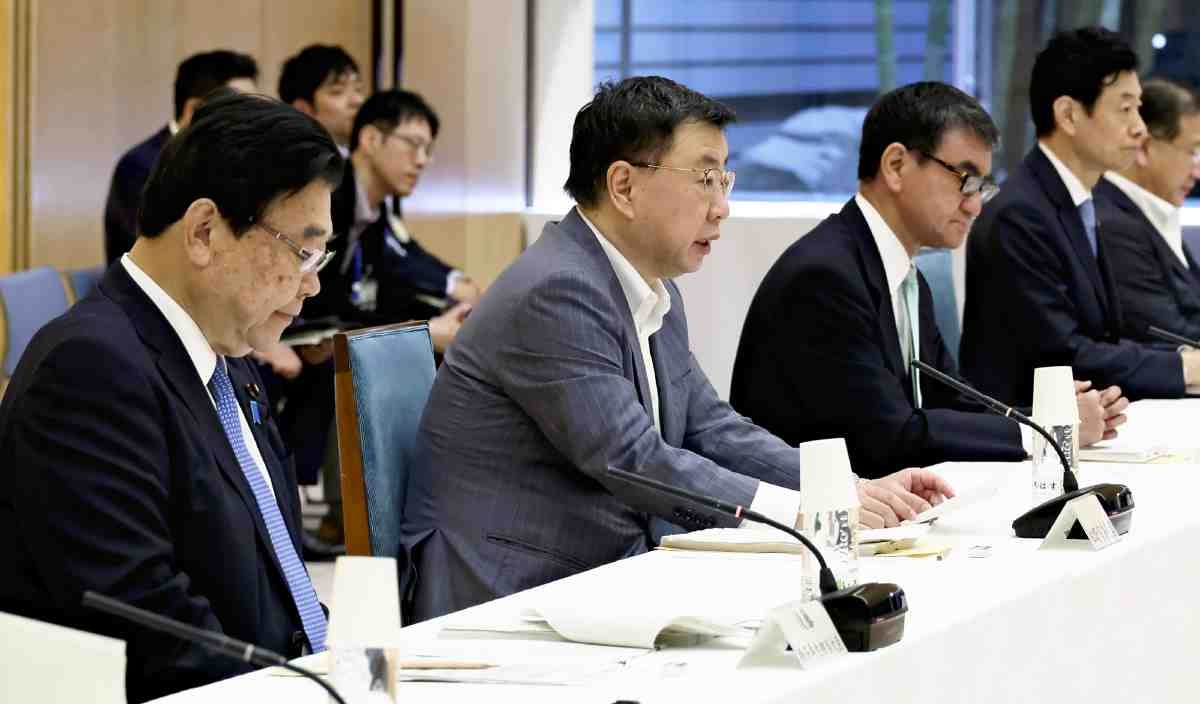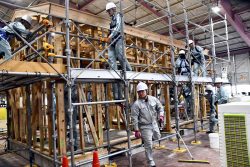
Chief Cabinet Secretary Hirokazu Matsuno, second from left, speaks at a meeting of the government’s Digital Market Competition Council at the Prime Minister’s Office on Friday morning.
20:00 JST, June 20, 2023
The Japanese government has drawn up a set of regulations targeting tech giants in Japan. The following is the first installment in a series examining the clash between the government and big tech companies amid global efforts to toughen tech rules.
***
On May 10, when government discussions on smartphone app marketplace regulations were reaching a critical juncture, Apple Inc. Vice President Kyle Andeer and other senior executives from the U.S. tech giant attended a Liberal Democratic Party policy hearing in Tokyo.
Many tech giants recruit people who used to work for Japanese government ministries and agencies to assist with political negotiations. At last month’s hearing, a former bureaucrat from the Internal Affairs and Communications Ministry who now heads the policy affairs department of Apple’s Japanese arm accompanied Andeer and the other executives.
Apple is against the Japanese government’s move to open up mobile app marketplaces such as the one used on the tech giant’s iPhone devices, claiming security could be compromised.
Apple Chief Executive Officer Tim Cook met with Prime Minister Fumio Kishida in December last year. During their meeting, Cook emphasized the contribution Apple has made to Japan, presumably hoping to temper regulatory moves.
Apple appeared to be determined to sway the ruling party and block the regulations at the May hearing, too.
According to the hearing documents, Apple has stressed that its App Store services have multiple layers of protection. Apple has also claimed that the government regulations being considered do not take into account the harmful security consequences for consumers.
In May, LDP lawmakers and others urged Apple to reveal the profit structure of its App Store services, amid suspicions the company has been profiting excessively from fees. However, a response was not forthcoming.
Both sides failed to reach an agreement on the regulatory proposals at the hearing.
“Excessively high fees must be redressed. Japan is not an Apple colony,” an indignant lawmaker said after the hearing.
The government had reason to not take Apple’s claims at face value. Apple imposes a fee derisively dubbed the “Apple tax” of up to 30% on app developers that use its marketplace. Developers have complained that the fees are too high, making it difficult to turn a profit.
Without competition from third-party app marketplaces, the problem will not be corrected.
On the other hand, consumers worried about a decline in security if the proposed regulations are introduced have been voicing concerns on social media. “Please don’t destroy the sense of security [associated with] iPhones,” one worried user posted online.
The government must find a solution that balances security and competition promotion.
According to sources, the government and Apple have been negotiating behind the scenes to find common ground, because the regulations will be meaningless if they are introduced without addressing tech giants’ concerns and cannot be enforced thoroughly.
The final report compiled by the government’s Digital Market Competition Council on Friday is peppered with expressions that reflect Apple’s concerns about security — a word that appears about 130 times in the document.
The report states that “[Apple] will be able to take the necessary steps to ensure security.”
Currently, users of Apple devices are not permitted to download apps from marketplaces other than the App Store, a rule Apple claims is for security reasons.
According to the report, the regulations will oblige Apple to allow users to download apps from third-party marketplaces.
“The government has kept its word on an issue for which there is no room for compromise,” someone who participated in the discussions said.
However, the final report is only a gateway to the introduction of regulations, and Apple is not hiding its opposition. In a statement, the company said it “respectfully disagreed with a number of conclusions.”
There is a possibility Big Tech will try to water down regulations while they are being devised. The clash between the government and tech giants is far from over.
Top Articles in Business
-

Prudential Life Insurance Plans to Fully Compensate for Damages Caused by Fraudulent Actions Without Waiting for Third-Party Committee Review
-

Narita Airport, Startup in Japan Demonstrate Machine to Compress Clothes for Tourists to Prevent People from Abandoning Suitcases
-

Japan, U.S. Name 3 Inaugural Investment Projects; Reached Agreement After Considerable Difficulty
-

JR Tokai, Shizuoka Pref. Agree on Water Resources for Maglev Train Construction
-

Toyota Motor Group Firm to Sell Clean Energy Greenhouses for Strawberries
JN ACCESS RANKING
-

Japan PM Takaichi’s Cabinet Resigns en Masse
-

Japan Institute to Use Domestic Commercial Optical Lattice Clock to Set Japan Standard Time
-

Israeli Ambassador to Japan Speaks about Japan’s Role in the Reconstruction of Gaza
-

Man Infected with Measles Reportedly Dined at Restaurant in Tokyo Station
-

Videos Plagiarized, Reposted with False Subtitles Claiming ‘Ryukyu Belongs to China’; Anti-China False Information Also Posted in Japan






















